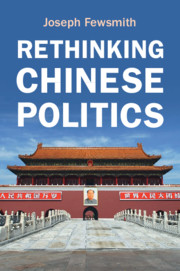Book contents
- Rethinking Chinese Politics
- Rethinking Chinese Politics
- Copyright page
- Dedication
- Contents
- Tables
- Figures
- Acknowledgments
- Abbreviations
- Introduction
- 1 The Dengist Structure of Power
- 2 Succession and the Art of Consolidating Power
- 3 Hu Jintao and the Limits of Institutionalization
- 4 The Pathologies of Reform Leninism
- 5 Xi Jinping’s Centralization of Power
- 6 The Nineteenth Party Congress and Reinvigorating Leninism
- Conclusion
- Bibliography
- Index
4 - The Pathologies of Reform Leninism
Published online by Cambridge University Press: 10 June 2021
- Rethinking Chinese Politics
- Rethinking Chinese Politics
- Copyright page
- Dedication
- Contents
- Tables
- Figures
- Acknowledgments
- Abbreviations
- Introduction
- 1 The Dengist Structure of Power
- 2 Succession and the Art of Consolidating Power
- 3 Hu Jintao and the Limits of Institutionalization
- 4 The Pathologies of Reform Leninism
- 5 Xi Jinping’s Centralization of Power
- 6 The Nineteenth Party Congress and Reinvigorating Leninism
- Conclusion
- Bibliography
- Index
Summary
This chapter lays out the argument that Leninism, under the conditions of reform, decays in a predictable manner. With reform, the mass movements that had focused the attention of cadres ceased, thus causing them to pay less attention to instructions from above. The result was that networks – factions – formed at the local level. It became increasingly difficult for leaders in Beijing to control local cadres. The result was that local cadres formed groups that were interested first and foremost in their own political and material gains. Under Hu Jintao, these networks extended right into Zhongnanhai (the leadership compound in Beijing) and often took a predatory turn with regard to the people they governed. In an effort to break up local networks, Beijing began to experiment with local elections within the party. These elections were tightly controlled, but they nevertheless violated the central governing principle of Leninism, namely that the “party controls the cadres” – in other words that power must flow from the top down.
Keywords
- Type
- Chapter
- Information
- Rethinking Chinese Politics , pp. 109 - 130Publisher: Cambridge University PressPrint publication year: 2021

